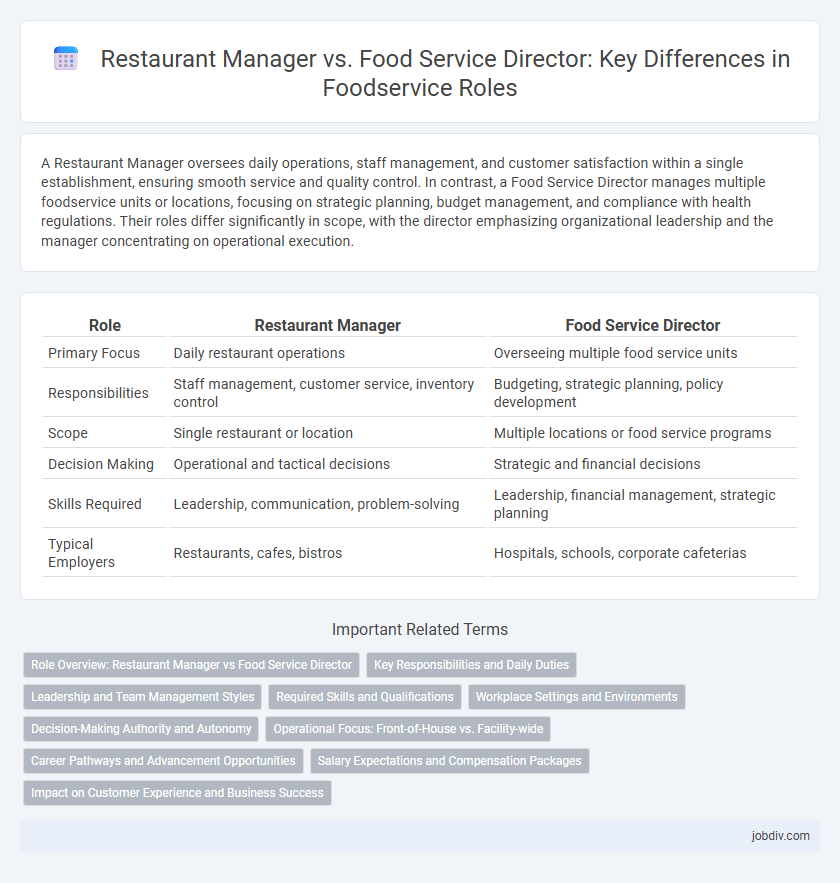A Restaurant Manager oversees daily operations, staff management, and customer satisfaction within a single establishment, ensuring smooth service and quality control. In contrast, a Food Service Director manages multiple foodservice units or locations, focusing on strategic planning, budget management, and compliance with health regulations. Their roles differ significantly in scope, with the director emphasizing organizational leadership and the manager concentrating on operational execution.
Table of Comparison
| Role | Restaurant Manager | Food Service Director |
|---|---|---|
| Primary Focus | Daily restaurant operations | Overseeing multiple food service units |
| Responsibilities | Staff management, customer service, inventory control | Budgeting, strategic planning, policy development |
| Scope | Single restaurant or location | Multiple locations or food service programs |
| Decision Making | Operational and tactical decisions | Strategic and financial decisions |
| Skills Required | Leadership, communication, problem-solving | Leadership, financial management, strategic planning |
| Typical Employers | Restaurants, cafes, bistros | Hospitals, schools, corporate cafeterias |
Role Overview: Restaurant Manager vs Food Service Director
A Restaurant Manager oversees daily operations, staff management, and customer service within a specific restaurant, ensuring efficient workflow and high-quality dining experiences. In contrast, a Food Service Director manages multiple foodservice outlets or an entire foodservice operation, focusing on strategic planning, budget control, and compliance with health regulations across all locations. While the Restaurant Manager addresses on-site operational challenges, the Food Service Director directs broader organizational goals and long-term growth initiatives.
Key Responsibilities and Daily Duties
A Restaurant Manager oversees daily front-of-house operations, including staff scheduling, customer service, inventory control, and ensuring compliance with health and safety regulations. Food Service Directors manage multiple foodservice locations, develop budgets, establish operational policies, negotiate vendor contracts, and analyze financial reports to optimize cost efficiency. Both roles require strong leadership, but Food Service Directors focus more on strategic planning and overall department performance.
Leadership and Team Management Styles
Restaurant managers emphasize hands-on leadership by directly supervising daily staff operations, fostering a collaborative environment that ensures efficient table service and customer satisfaction. Food Service Directors adopt a strategic leadership style, overseeing multiple units and focusing on policy development, staff training programs, and long-term team performance goals. Both roles require strong communication skills and conflict resolution abilities, but the director's role demands broader organizational vision, while the manager's role centers on immediate team motivation and operational execution.
Required Skills and Qualifications
A Restaurant Manager must possess strong leadership, customer service, and operational skills, often requiring experience in frontline staff supervision and inventory management, with a background in hospitality or business management. A Food Service Director typically needs advanced skills in budgeting, food safety compliance, and strategic planning, alongside qualifications such as a degree in nutrition, dietetics, or food service management. Both roles demand excellent communication and problem-solving abilities, but the director position usually entails broader administrative responsibilities and regulatory knowledge.
Workplace Settings and Environments
Restaurant Managers typically oversee daily operations in casual or fine dining establishments, managing front-of-house staff and ensuring customer satisfaction in dynamic, fast-paced environments. Food Service Directors operate in larger institutional settings such as hospitals, schools, or corporate cafeterias, focusing on strategic planning, menu development, and compliance with health regulations in structured, large-scale operations. Both roles require strong leadership skills but differ significantly in scope, with Restaurant Managers emphasizing guest experience and Food Service Directors prioritizing operational efficiency and regulatory adherence.
Decision-Making Authority and Autonomy
Restaurant Managers oversee daily operations with direct authority over staff scheduling, customer service, and inventory control within a single location. Food Service Directors hold higher-level decision-making power, managing multiple units or facilities, setting strategic goals, budgeting, and ensuring compliance with organizational policies. The autonomy of Food Service Directors extends to policy development and resource allocation, whereas Restaurant Managers operate within established frameworks to execute operational decisions.
Operational Focus: Front-of-House vs. Facility-wide
A Restaurant Manager oversees front-of-house operations, ensuring customer satisfaction, staff coordination, and service quality within a single establishment. In contrast, a Food Service Director manages facility-wide operations, including multiple dining venues, budget control, regulatory compliance, and strategic planning. The Restaurant Manager's role is focused on day-to-day customer interaction and staff management, while the Food Service Director handles broader organizational goals, operational efficiency, and cross-departmental coordination.
Career Pathways and Advancement Opportunities
Restaurant Managers typically start their careers overseeing daily operations, focusing on staff management and customer service, with advancement opportunities leading to Food Service Director roles. Food Service Directors manage multiple units or large-scale operations, emphasizing strategic planning, budgeting, and compliance, often progressing to senior leadership or corporate positions within hospitality or healthcare sectors. Career pathways differ by scope and responsibility, with managers gaining hands-on experience and directors developing broader administrative expertise.
Salary Expectations and Compensation Packages
Restaurant managers typically earn between $45,000 and $65,000 annually, with compensation packages including performance bonuses and profit-sharing options. Food service directors command higher salaries, ranging from $60,000 to $100,000 or more, reflecting their broader responsibilities in overseeing multiple outlets or large institutions, often complemented by comprehensive benefits such as health insurance, retirement plans, and executive perks. Salary variations depend on location, establishment size, and experience level within the foodservice industry.
Impact on Customer Experience and Business Success
Restaurant Managers directly influence daily customer satisfaction by overseeing service quality, staff performance, and operational efficiency, ensuring seamless dining experiences. Food Service Directors shape broader strategic initiatives, including menu development, vendor relationships, and budget management, driving long-term business growth and brand reputation. Effective collaboration between these roles enhances customer loyalty and maximizes profitability in competitive foodservice environments.
Restaurant Manager vs Food Service Director Infographic

 jobdiv.com
jobdiv.com